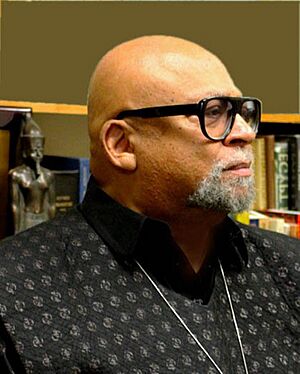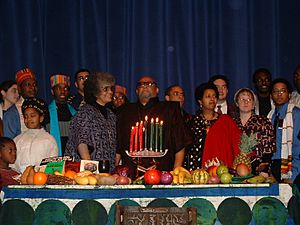Maulana Karenga facts for kids
Quick facts for kids
Maulana Karenga
|
|
|---|---|

Karenga in 2011
|
|
| Born |
Ronald McKinley Everett
July 14, 1941 Parsonsburg, Maryland, U.S.
|
| Occupation |
|
| Spouse(s) | Brenda Lorraine "Haiba" Karenga (divorced) Tiamoyo Karenga (1971–) |
Maulana Ndabezitha Karenga (born Ronald McKinley Everett, July 14, 1941) is an American activist, author, and professor. He is most famous for creating Kwanzaa, a special holiday for people of African heritage.
Karenga was born in Parsonsburg, Maryland. He studied at Los Angeles City College and the University of California, Los Angeles. In the 1960s, he was active in the Black Power movement. He joined groups like the Congress of Racial Equality and the Student Nonviolent Coordinating Committee. In 1965, Karenga helped start a group called the US Organization.
In 1966, Karenga created Kwanzaa. He based this holiday on African "first fruit" traditions. Kwanzaa rituals help people celebrate African traditions, including the "seven principles of African heritage." At first, Karenga said Kwanzaa was a Black alternative to Christmas. Later, he changed his view, saying Kwanzaa was not meant to replace anyone's religion or religious holiday.
Karenga has earned two doctorate degrees. One was in Political Science in 1976, and another in Social Ethics in 1994. Today, he leads the Africana Studies Department at California State University, Long Beach. He has also written many books.
Contents
Early Life and Education
Karenga was born in Parsonsburg, Maryland. He was the 14th child in his family. In 1959, he moved to Los Angeles to live with his older brother. He attended Los Angeles City College. There, he became involved in civil rights groups like the Congress of Racial Equality and the Student Nonviolent Coordinating Committee. He also became interested in African studies. He was the first African-American student president at LACC.
After getting his first degree, he went to the University of California, Los Angeles (UCLA). He earned both a bachelor's and a master's degree in political science. He studied Swahili, Arabic, and other subjects related to Africa. During his time at UCLA, he chose the name Karenga, which means "keeper of tradition" in Swahili. He also took the title Maulana, which means "master teacher" in Swahili-Arabic.
The US Organization
The Watts riots happened when Karenga was studying for his doctorate. After these events, the Black Congress was formed to help rebuild the community. Within this group, a discussion group called the Circle of Seven was created. This group focused on black nationalist ideas and included Karenga. In 1966, they formed an organization called US. The name "US" meant "Us black people."
The US Organization took part in many community programs. Karenga was influenced by Malcolm X's ideas about Pan-Africanism. He believed in the need for a cultural revolution. He felt that Black people should return to African culture and spirit, even if they could not go there physically.
Karenga later focused the US Organization more on promoting African culture. The group also developed a youth part called the Simba Wachanga. This group supported community self-defense and helping others. In 1966, Karenga started a newspaper called Harambee. It began as a newsletter for US and later became the newspaper for the Los Angeles Black Congress.
Kwanzaa: A Celebration of Heritage

Karenga created Kwanzaa in 1966. It was designed to be the first pan-African holiday. His goal was to give Black people a new holiday. This holiday would allow them to celebrate themselves and their history.
Kwanzaa is inspired by African "first fruit" traditions. The name "Kwanzaa" comes from the Swahili phrase "matunda ya kwanza," which means "first fruits." The holiday's traditions promote African heritage and the Nguzo Saba. These are the "seven principles of African Heritage." Karenga described them as a way of thinking that focuses on community.
The Seven Principles are:
- Umoja (unity)—To work for and keep unity in the family, community, nation, and race.
- Kujichagulia (self-determination)—To define ourselves, name ourselves, create for ourselves, and speak for ourselves.
- Ujima (collective work and responsibility)—To build and keep our community together. To make our brother's and sister's problems our problems and solve them together.
- Ujamaa (cooperative economics)—To build and keep our own stores, shops, and other businesses. To profit from them together.
- Nia (purpose)—To make our main goal building and developing our community. This is to help our people return to their traditional greatness.
- Kuumba (creativity)—To always do as much as we can, in the best way we can. This is to leave our community more beautiful and helpful than we found it.
- Imani (faith)—To believe with all our heart in our people, our parents, our teachers, our leaders, and the rightness and success of our struggle.
Later Career and Contributions
After a period of time, Karenga re-established the US Organization with a new structure.
He earned his first PhD in leadership and human behavior in 1976. In 1977, he developed a set of ideas called Kawaida. This is a Swahili term meaning "normal."
Karenga also directed the Kawaida Institute for Pan African Studies. He has written several books. His book Introduction to Black Studies is a widely used textbook for Black/African Studies. It was first published in 1982 and is now in its fourth edition (2010). In 1984, he helped host a conference that led to the creation of the Association for the Study of Classical African Civilizations.
In 1994, he received a second PhD in social ethics. In 1995, he was part of the organizing committee for the Million Man March. He also wrote the mission statement for this important event.
In 2001, Karenga gave a speech at the funeral service for New Black Panther Party leader Khalid Abdul Muhammad. He praised him for his organizing work and dedication to Black empowerment. In 2002, scholar Molefi Kete Asante included Maulana Karenga in his list of 100 Greatest African Americans.
As of 2025, Karenga continues to lead the Africana Studies Department at California State University, Long Beach.
Films
- Owen Alik Shahadah's documentary 500 Years Later (2005) and its sequel Motherland (2010)
- M.K. Asante's documentary The Black Candle (2012)
Published Works
- Introduction to Black Studies. 2010, 4th edition, University of Sankore Press. ISBN: 0943412307
- Kwanzaa: A Celebration of Family, Community and Culture. 1998. ISBN: 0943412218
- Maat, The Moral Ideal in Ancient Egypt. ISBN: 0415947537
- Odu Ifa: The Ethical Teachings. ISBN: 0943412226
- Kawaida and Questions of Life and Struggle. ISBN: 0943412293
- Selections from the Husia. ISBN: 0943412064
- Book of Coming Forth By Day. ISBN: 0943412145
- Handbook of Black Studies, co-edited with Molefi Kete Asante. ISBN: 0761928405
- The Million Man March/Day of Absence: A Commemorative Anthology, co-edited with Haki Madhubuti. ISBN: 0883781883
- Maulana Karenga: An Intellectual Portrait, Polity. ISBN: 0745648282

